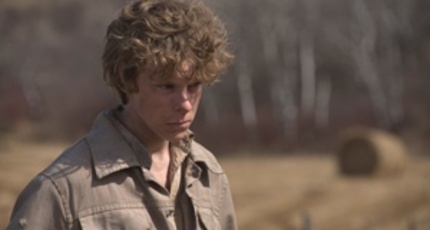TIFF 09: GEORGE RYGA'S HUNGRY HILLS Review

Beautifully shot from a timeless story, Rob King's adaptation of George Ryga's novel Hungry Hills is a picture with potential to raise quite a stir with fans of period drama, westerns and even crime noir. Unfortunately, despite the beautiful production values, it struggles somewhat to make the transition from stage to screen thanks to a group of actors who seem to struggle really embodying the period of the picture, generally feeling somewhat stiff and rigid rather than like believable residents of the period.
The story revolves around a young man known simply as Snit, a man packed up and forcibly shipped off to a welfare home - not quite a juvenile detention center, not quite an orphanage - some years before, his only family being an aunt struggling with mental illness. Hating his pointless and violent life at the home Snit packs up and escapes one night, hoping to re-establish himself on the family farm only to find that he is ostracized by almost the entire town, viewed with suspicion because of his aunt's history of illness.
Wanting to build a better life and seeing only one way to do it, Snit throws his lot in with Johnny, another outcast young man, and begins helping out with Johnny's bootlegging operation. Though illegal, bootlegging is common enough that it is most often overlooked but not right now, not with someone brewing up batches of moonshine that are proving hazardous in the extreme and it isn't long before Johnny and Snit are on the run.
Blessed with gorgeous art direction and a very strong cinematographer Hungry Hills is gorgeous to look at, a sumptuous recreation of 1920's hard-scrabble dirt farming life. The buildings are all slipping into decay, the landscape blasted and hostile. Director Rob King clearly knows and love his surroundings and succeeds marvelously in making the environment a vital character within the film. The actors, however, particularly the young ones, struggle significantly with capturing the era, the rhythms of their speech and dialogue not coming naturally to them, lines coming out just a touch awkward, just a touch stiff. And that awkwardness proves damaging, as it prevents the viewer from really connecting with the characters and empathizing with their situation, it keeps you at a distance just far enough out to admire the look without truly entering the world.
The story revolves around a young man known simply as Snit, a man packed up and forcibly shipped off to a welfare home - not quite a juvenile detention center, not quite an orphanage - some years before, his only family being an aunt struggling with mental illness. Hating his pointless and violent life at the home Snit packs up and escapes one night, hoping to re-establish himself on the family farm only to find that he is ostracized by almost the entire town, viewed with suspicion because of his aunt's history of illness.
Wanting to build a better life and seeing only one way to do it, Snit throws his lot in with Johnny, another outcast young man, and begins helping out with Johnny's bootlegging operation. Though illegal, bootlegging is common enough that it is most often overlooked but not right now, not with someone brewing up batches of moonshine that are proving hazardous in the extreme and it isn't long before Johnny and Snit are on the run.
Blessed with gorgeous art direction and a very strong cinematographer Hungry Hills is gorgeous to look at, a sumptuous recreation of 1920's hard-scrabble dirt farming life. The buildings are all slipping into decay, the landscape blasted and hostile. Director Rob King clearly knows and love his surroundings and succeeds marvelously in making the environment a vital character within the film. The actors, however, particularly the young ones, struggle significantly with capturing the era, the rhythms of their speech and dialogue not coming naturally to them, lines coming out just a touch awkward, just a touch stiff. And that awkwardness proves damaging, as it prevents the viewer from really connecting with the characters and empathizing with their situation, it keeps you at a distance just far enough out to admire the look without truly entering the world.

Do you feel this content is inappropriate or infringes upon your rights? Click here to report it, or see our DMCA policy.






